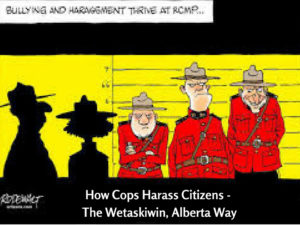 Police harassment is a serious issue. No one wants to be hassled by the cops. That’s true, but the vast number of contacts between the police and the public are really good. However, there’re rare times where some cops overstep their civil boundaries and exercise questionable behavior when dealing with citizens. Then, there’s time for fun.
Police harassment is a serious issue. No one wants to be hassled by the cops. That’s true, but the vast number of contacts between the police and the public are really good. However, there’re rare times where some cops overstep their civil boundaries and exercise questionable behavior when dealing with citizens. Then, there’s time for fun.
Most police harassment complaints are trumped up or leave something out about what started the conflict. Over my years in policing, I can honestly say I never saw a case where an officer intentionally went overboard without there being some sort of provocation on a citizen’s part. Maybe that’s because I’m from Canada where we’ve got polite policing down to a science—especially our red-coated Mounties who start reading suspect rights with a “Sorry”.
 I won’t say legitimate police harassment doesn’t happen. But, I will say there’re usually two sides to a story. Speaking of stories, I got a laugh the other day when a friend shipped me a letter from Wetaskiwin’s local newspaper. For those who’ve never heard of Wetaskiwin, it’s a small town 40 miles south of Edmonton, in the Province of Alberta in western Canada. Like so many Canadian prairie towns, Wetaskiwin has the Royal Canadian Mounted Police (RCMP) maintaining their right.
I won’t say legitimate police harassment doesn’t happen. But, I will say there’re usually two sides to a story. Speaking of stories, I got a laugh the other day when a friend shipped me a letter from Wetaskiwin’s local newspaper. For those who’ve never heard of Wetaskiwin, it’s a small town 40 miles south of Edmonton, in the Province of Alberta in western Canada. Like so many Canadian prairie towns, Wetaskiwin has the Royal Canadian Mounted Police (RCMP) maintaining their right.
They’ve also got an RCMP Sergeant with a great sense of humor. Part of the Wetaskiwin, Alberta RCMP detachment’s community service is maintaining a newspaper crime page. This article was so bang-on that I had to steal the content and post it on DyingWords. With no apologies for plagiarism or copyright invasion, here’s how the good Sergeant replied to this reader question:
“I’d like to know how it’s possible for police officers to continually harass people and get away with it?”
Sergeant Dooright: “First off, let me tell you this—it ain’t easy. In Wetaskiwin and rural surrounding areas, we average one cop for every 505 people. Only about 60 percent of our cops are on general duty (or what you might refer to as “general patrols”). This is where we do most of our harassing.
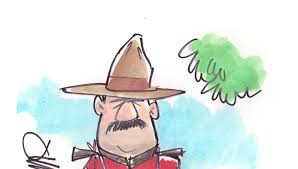 The rest are in non-harassing units that don’t allow them to contact with day to day innocents. And, at any given moment, only one-fifth of the 60 percent of general patrols are on duty and available for harassing people. The rest are off duty. They don’t want to be bothered harassing people on their own time.
The rest are in non-harassing units that don’t allow them to contact with day to day innocents. And, at any given moment, only one-fifth of the 60 percent of general patrols are on duty and available for harassing people. The rest are off duty. They don’t want to be bothered harassing people on their own time.
So, roughly, one cop is responsible for regularly harassing about 6000 permanent residents at any given time. When you toss in the commercial business and tourist locations that attract people from other areas, sometimes you got a situation where a single cop is responsible for harassing 15,000 people a day. Or maybe even more.
Consider this—your average cop’s eight-hour shift runs 28,800 seconds long. This gives that cop only two-thirds of a second to harass a person. Then they have just another third of a second to sip a Tim Horton’s coffee, scarf a donut, and then find a new person to harass. This isn’t an easy task. Far from it.
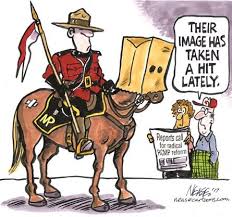 To be honest, most cops aren’t up to the challenge day in and day out. It’s just too tiring. What we do is utilize some trade tools to help narrow down those people we can realistically spend time giving quality harassment.
To be honest, most cops aren’t up to the challenge day in and day out. It’s just too tiring. What we do is utilize some trade tools to help narrow down those people we can realistically spend time giving quality harassment.
PHONE: People will call us up and point out things that cause us to focus on a person for special harassment. For example, “My neighbor is beating his wife” is a code phrase often used. This means we’ll come out and give somebody some special harassment. Another popular one is, “There’s a guy breaking into a house.” The harassment team is then put into action.
CARS: We have special cops assigned to harass people who drive. They like to harass the drivers of fast cars, cars with no insurance, or drivers with no licenses and the like. It’s lots of fun when you pick them out of traffic for nothing more obvious than running a red light. Sometimes you get to really heap the harassment on when you find they have drugs in the car, they are drunk or have an outstanding warrant on file.
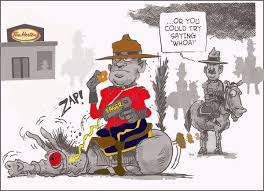 LAWS: When we don’t have phones or cars and have nothing better to do, there are actually books that give us ideas for reasons to harass folks. They’re called “Statutes”. These include the Crimes Act, Summary Offences Act, Land Transport Act and a whole bunch of others.
LAWS: When we don’t have phones or cars and have nothing better to do, there are actually books that give us ideas for reasons to harass folks. They’re called “Statutes”. These include the Crimes Act, Summary Offences Act, Land Transport Act and a whole bunch of others.
Laws spell out all sorts of things for how you can really mess with people. After you read the law, you can just drive around for a while until you find someone violating one of these listed offenses and harass them. Just last week, I saw a guy trying to steal a car. Well, the book says that’s not allowed. That meant I had permission to harass this guy.
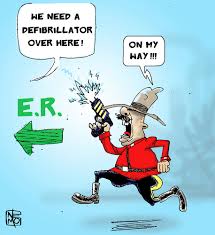 It is a really cool system we’ve set up, and it works pretty well. We seem to have a never-ending supply of folks to harass. And we get away with it. Why? Because, for the good citizens who pay the tab, we try to keep the streets safe for them, and they pay us to “harass” some people.
It is a really cool system we’ve set up, and it works pretty well. We seem to have a never-ending supply of folks to harass. And we get away with it. Why? Because, for the good citizens who pay the tab, we try to keep the streets safe for them, and they pay us to “harass” some people.
Next time you’re in small-town Wetaskiwin, Alberta, Canada, give me the old “single finger wave”. That’s another one of those codes. It means, “You can harass me.” It’s one of our favorite harassment go-aheads—and I love getting away with it.”

I’ve seen quite a lot of police harassment in my time and I always applaud it. Guess I’m just a bit contrary that way! 😉
I spent 20 years harassing people and always got away with it. Gotta say I loved it, too 🙂 Thanks for stopping by, Marcia!
Aside from (in addition to?) the chuckle, those stats about how many harassing officers there are per citizen and tourist are interesting. Is that a typical ratio, Garry, for rural areas? What about cities? The village I live in (pop 350) has two resident RCMP officers – both the harassing type – but we don’t have a Timmie’s so don’t see much of them, except off-shift.
Hi Donna, Nice to hear from you and that you got a chuckle from this. Yes, I’d say those stats are right. Something many Canadians don’t know about the RCMP is their structure is para-military, not unionized like provincial and municipal forces are. That allows a much greater police to citizen ratio in RCMP jurisdictions. That way they have much lower staffing levels and therefore are much cheaper on the taxpayer than union forces. Like so much in life, policing is about budgets and money saving 🙂
Hahahahahahahahahahahahahahahahaha!!!! What a perfect response to a stupid question.
I thought you’d get a kick out of it, Sue 🙂